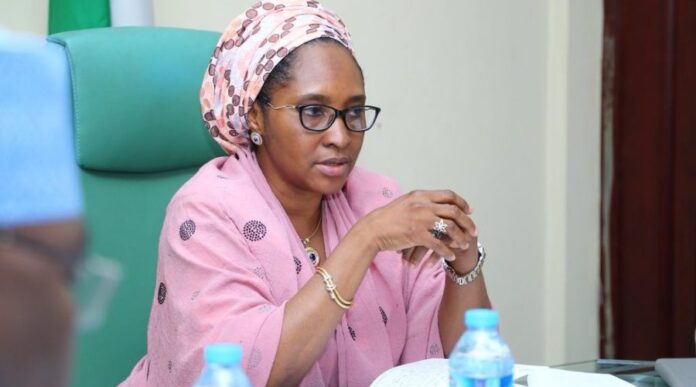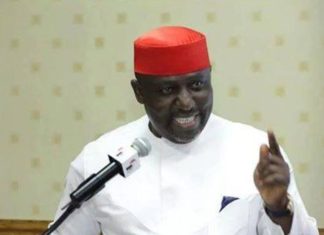Deficit spending jumps YoY in 2021
By Jeph Ajobaju, Chief Copy Editor
Nigeria’s budget deficit spending notched up N7.052 trillion in the 11 months ending November 2021 (11M 2021), a 33 per cent increase against N5.32 trillion in 11M 2020, spurred by a mixture of low oil receipts, corruption, and stealing of funds.
The sum is 9.2 per cent above the N6.449 trillion deficit in the 2021 budget.
Finance Minister Zainab Ahmed disclosed at the public presentation of the 2022 budget in Abuja that deficit spending rose to N7.052 trillion instead of N5.911 trillion prorate.
Her disclosure confirmed a report by Vanguard last December that deficit spending had risen 39 per cent year-on-year (YoY) to N5.5 trillion in eight months ending August (8M 2021) from N3.97 trillion in 8M 2020, based on Central Bank of Nigeria (CBN) data.
Ahmed said the 2021 budget implementation report is provisional, capturing only the first 11 months. Meaning deficit spending could be higher when the report for the full year is concluded.
As of November 2021, she added, aggregate revenue was N5.51 trillion (74 per cent of target), stressing that the economy would not have exited the recent recession without the deficit spending.
Her words: “Having witnessed two economic recessions we have had to spend our way out of recession, which contributed significantly to the growth in the public debt.
“It is unlikely that our recovery from each of the two recessions would have been as fast without the sustained government expenditure funded partly by debt.
On the 2021 budget performance, Ahmed said: “FGN share of oil revenues was N970.3 billion (representing 53 per cent performance of the prorated sum in the 2021 budget).
“FGN share of non-oil tax revenues totaled N1.62 trillion (118.8per cent over and above the target).
“Companies Income Tax (CIT) and Value Added Tax (VAT) collections were N718.58 billion and N360.56 billion, representing 115 per cent and 165 per cent respectively of the prorata targets for the period.”
__________________________________________________________________
Related articles:
Security and pandemic raise federal deficit spending to N5tr
Nigeria in N1.87b trade deficit. But merchandise trade rises 23.28%
Buhari wallops Nigeria with 44.6% deficit in five months
External reserves at $40.5b go through worst cycle in 2 years
__________________________________________________________________
Non-oil revenue galloping
Non-oil revenue exceeded its target of N1.488 trillion, recording N1.621 trillion, a positive variance of N256.4 billion or 18. 8 per cent increase, according to her, as reported by Vanguard.
She added that out of the N2.011 trillion oil revenue forecast in the 2021 budget, N1.843 trillion should have been realised as of end November but only N970.33 billion was recorded, a shortfall of about 47 per cent.
“On the expenditure side, N12.56 trillion (or 94.1 per cent) has been spent out of the N13.57 trillion prorata budget. This performance is inclusive of expenditure estimates of the GOEs but exclusive of project-tied loans.
“Of the expenditure, N4.20 trillion was for debt service, and N3.02 trillion for Personnel costs, including Pensions.
“As at November 2021, N3.40 trillion had been expended for capital. Of this, N2.98 trillion represents 83 per cent of the provision for MDAs’ capital, N369.9 billion for Multilateral/Bilateral project-tied loans, and N49.52 billion as GOEs capital expenditure.”
Ahmed expressed delight at non-oil sector growth, saying it shows greater resilience, recording 5.44 per cent in real terms in Q3 2021.
“In real terms, the non-oil sector contributed 92.51 per cent to GDP in Q3 2021, higher from the share recorded in the Q3 2020 which was 91.27 per cent.
“As at November, 2021, we had surpassed all collections for FGN independent revenues from 2017 to date. This reflects performance of our revenue growth initiatives for this revenue stream.
“We have now for the first time surpassed the N1 trillion mark collection for independent revenues (N1.104 trillion collected as at November against a budget target of 973.41 billion).
“Analysts have always considered our projections unrealistic, but we have always insisted on the potentials that exist to grow FGN independent revenue.”
Budget 2022
The key assumptions of the 2022 budget include:
- Oil production – 1.88 million barrels per day (mbpd)
- Oil benchmark price – $62 per barrel (pb). (Lawmakers raised it from $57pb proposed by the executive)
- Exchange rate – N410.15/$1
- Inflation rate – 13 per cent
- Nominal Consumption – N119.28 trillion
- Nominal Domestic Product – N184.38 trillion
- GDP growth rate – 4.20 per cent
Ahmed said the 2022 budget would continue “the reflationary policies of the 2020 and 2021 budgets, which helped put the economy back on the path of recovery and growth.
“The projected aggregate revenue available to fund the 2022 budget of N10.74 trillion (inclusive of GOEs) is 32 per cent higher than the 2021 projection of N8.12 trillion.
“The revenue will fund the 2022 aggregate FG expenditure of N17.13 trillion, which is 18per cent higher than the 2021 budget.”
Nigeria’s N38tr debt
Ahmed insisted that Nigeria’s debt (N38 trillion in Q2 2021) remains sustainable.
“This is to restate that the debt level of the FG is still within sustainable limits. ªper cent Borrowings are essentially for Capital Expenditure and Human Development, as specified in Section 41(1)a of the Fiscal Responsibility Act 2007.
“The country has technically been at war, with the pervasive security challenges across the nation. This has necessitated massive expenditures on security equipment and operations, contributing to the fiscal deficit. The Defence and Security sector accounts for 22 per cent of the 2021 budget.
“Nigeria’s Budget Deficit/GDP (-4.3 per cent, as at November 2021) and Debt/GDP ratios (30per cent as at September 2021) are the lowest among Africa’s leading economies.
“However, Nigeria’s Debt Service/Revenue ratio (76 per cent as at November 2021) is the highest among same African top economies. This is proof that what we have is not a classic debt sustainability problem, but a revenue challenge.
Allocation by sector
- Defence and Security got the highest amount – N2.29 trillion (13.4 per cent).
- Infrastructure, including Works, Housing, Power, Transport, Water Resources and Aviation – N1.42 trillion (8.3 per cent).
- Educational – N1.234 trillion. Out of which the Education Ministry and its agencies got N815.69 billion), Tertiary Education Trust Fund (TETFund) (N306 billion) and Universal Basic Education Commission (UBEC) (N112.29 billion).
- Health – N876.38 billion.













